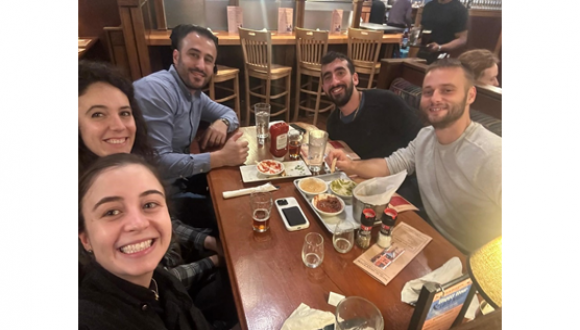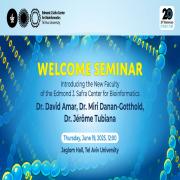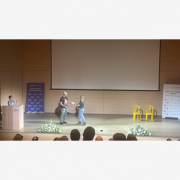April 2024: Edmond J. Safra students participating in NCI Spring School on Algorithmic Cancer Biology
Five graduate students from the Edmond J. Safra Center participated in the NCI Spring School on Algorithmic Cancer Biology that took place on April 1-5 2024 at the NIH Bethesda Campus, Maryland, USA.
NCI-Edmond J. Safra ongoing collaboration - NCI Spring School on Algorithmic Cancer Biology
Last year we have established a new collaboration with the National Cancer Institute (NCI) at the National Institutes of Health (NIH), USA, that allowed Edmond J. Safra student fellows to participate in the NCI Spring School on Algorithmic Cancer Biology (SSACB). We are happy to report that this collaboration continued also this year, when Edmond J. Safra student fellows could apply to attend this school, and were admitted to the school with no registration fee.
The NCI Spring School on Algorithmic Cancer Biology took place on April 1-5, 2024 at the NIH Bethesda Campus, Maryland, US. It brought together a small group of participants, including thirty faculty with long-standing experience in developing rigorous computational methods with applications to Cancer Biology. Five graduate students from the Edmond J. Safra Center for Bioinformatics at TAU participated, including: Tal Gutman, Edmond J. Safra PhD fellow (Tuller lab, Engineering), Thomy Margalit, Edmond J. Safra MSc fellow (Shamir lab, Computer Science), Michael Monsonego, MSc student (Mayrose lab, Life Sciences) Ori Moskowitz, MD-PhD student (Cohen lab, Medicine), and Rami Nasser, Edmond J. Safra PhD fellow (Sharan lab, Computer Science).
The faculty presentations were a mix of tutorials and scientific talks, and the school provided a friendly and relaxed atmosphere with many opportunities for interactions amongst faculty and trainees. The research topics were diverse and included algorithms for tumor evolution and phylogenetics, and the deconvolution of phylogenetic trees of tumors from bulk sequencing data. Other areas highlighted were the processing and modeling of spatial genomics and transcriptomics of single-cell data within the tumor microenvironment, along with computational strategies for precision oncology, particularly precision immunotherapy. Numerous exciting talks by faculty members focused on single-cell bulk gene expression research, with two presentations standing out, according to the students’ report, for elevating this field to new heights. The first, by Prof. Ben Raphael, showcased an innovative project named Gaston, which employs a 2D gene expression grid to construct intricate topological structures. The second, by Prof. Eytan Ruppin, former Edmond J. Safra member, and now Chief of the NCI/NIH Cancer Data Science Lab (CDSL), highlighted several ongoing projects from his lab, with particular emphasis on one involving the construction of 3D tumor topology from RNA-seq data.
In addition to the talks given by the faculty members, Tal Gutman, and Ori Moskowitz, delivered lightning talks on their projects. Tal presented her work titled “revisiting the effects of MDR1 variants using computational approaches”. Ori presented his project titled “Neutrophils physically interact with breast cancer cells inducing disease progression”. Furthermore, the Edmond J. Safra students participated in the poster session, with three students presenting their research, Tal Gutman, Ori Moskowitz, and Michael Monsonego. Presenting the posters was an enriching experience that allowed the students to display their findings, engage in fruitful discussions, and receive valuable feedback from other attendees. This session and the lightning talks not only allowed them to showcase their work, but also gave them the opportunity to explore the work of other students from various institutions. Learning about the innovative approaches and methodologies utilized by peers was incredibly enlightening and provided a broader perspective on the field.
The spring school's agenda included several social activities that enhanced networking opportunities with other students and faculty from various institutions. The first event was the bowling night and dinner, providing a relaxed setting for lively social interactions. Additionally, the students participated in a guided tour of the National Mall, led by one of the local students, where they explored the area's rich history and iconic landmarks. The series of social events concluded with an enjoyable visit to a baseball game, allowing the students to experience a true American experience. These activities significantly enriched the conference experience by fostering a sense of community and camaraderie among participants.
For pictures click here.




